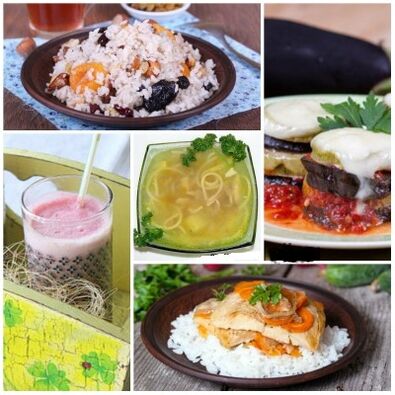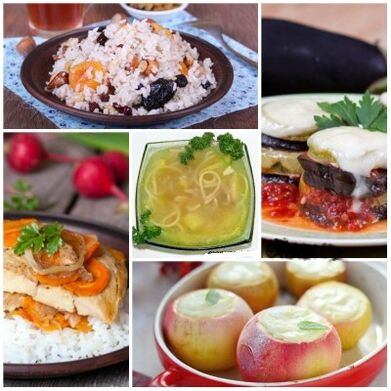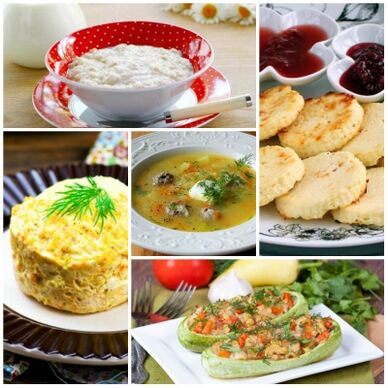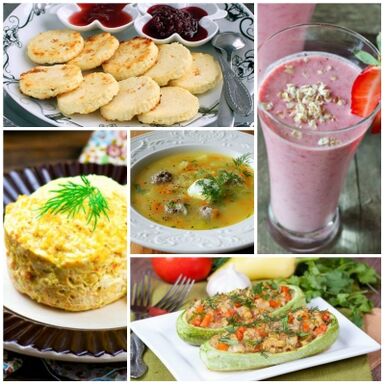Pancreatitis is a disease of the pancreas, during which the organ's cells are destroyed by its own enzymes. In the phase of exacerbation, the cells of the gland are destroyed, in the phase of remission, connective tissue is formed in the place of dead cells. This greatly disrupts the work of the pancreas. The most common causes of pancreatitis are alcohol abuse and eating disorders, so treatment should be started with nutrition.
Nutritional recommendations for each patient should be selected individually, depending on the severity of the condition, stage of the disease, food intolerance and concomitant diseases. The menu below for pankteatitis is suitable for the phase of remission (that is, for the period in which there is no exacerbation) and will help to avoid the subsequent exacerbation.
The basic principles of the menu for pancreatitis:
- The purpose of the diet is to improve the work of the pancreas, reduce the load on the digestive system.
- Limitation of simple carbohydrates: sweets, baked goods, sugar. Sugar is partially replaced by xylitol or sorbitol. From the allowed sweets: jam, honey, jam.
- The fractional diet - 5-6 times a day.
- Cooking - steamed, baked and boiled. It is necessary to clean the fibrous meat and vegetables rich in dietary fiber (carrots, broccoli, cabbage, fresh herbs).
- The temperature of the dishes is normal, cold dishes are excluded.
- During the period of remission, the menu may include vegetable and cereal soups in the diet. At the same time, the vegetables must be well boiled.
- You can use meat, skinless poultry, low-fat varieties of fish, boiled and baked. Do not use offal (liver, kidney, brain), smoked meats, salted fish, caviar, sausages, canned food.
- From the allowed dairy products - cottage cheese (up to 20%), milk, sour-milk drinks, sour cream in dishes.
- It is recommended to use eggs in the form of omelets or soft-boiled. It is best not to use fried or boiled eggs.
- At the stage of remission with pancreatitis, it is necessary to include various vegetables and fruits in the diet in a raw, baked, boiled and stewed form. During the period of exacerbation, fresh vegetables and fruits are excluded.
- Drinks: weak tea, coffee with milk, rosehip broth and fruit drinks diluted in half with water, unsweetened fruit juices. Excluded: black coffee, cocoa, carbonated drinks.
- Do not use foods that stimulate the digestive system: spinach, sorrel, radish, radish, garlic, mushrooms, pickles, sour fruit.
- Watch out for spicy seasonings: horseradish, mustard, pepper. You can use: dill, parsley, basil, cinnamon.
- Alcohol with pancreatitis is strictly contraindicated.
Fresh fruit can be added to the menu below for pancreatitis, for example apples, pears, bananas, peaches, apricots, non-acid plums, etc. and supplement the diet with fermented milk products - kefir, yogurt, yogurt, fermented cooked milk.
Pancreatitis weekly menu, ready-made and tested recipes, shopping list for the whole week.
Monday

Breakfast:sweet pilaf with dried fruit;
Dinner:chicken noodle soup; baked zucchini and eggplant with cheese;
Afternoon snack:smoothie with strawberries and banana;
Dinner:baked halibut fillet.
Nutritionist comment:
To make sweet pilaf suitable for a patient with pancreatitis, exclude walnuts, cranberries and reduce the amount of sugar to 1 tbsp.
We add vegetables to the soup without frying, this will reduce the load on the pancreas.
Spicy spices must be excluded from recipes.
I recommend choosing milk for a cocktail with a fat content of no more than 2. 5%, and as for coffee, it is better to exclude it from the recipe, it is not recommended to use this product with pancreatitis.
You can use any of the methods to make halibut fillets, both of which are good for illness. You can choose a side dish with wheat, for example, boiled buckwheat or vegetables - cauliflower, broccoli, potatoes, zucchini, etc. Choose a method of cooking vegetables that does not cloud the taste of the fish or cause any aggravation, such as boiling or steaming vegetables.
Tuesday

Breakfast:sweet pilaf with dried fruit;
Dinner:chicken noodle soup; baked zucchini and eggplant with cheese;
Afternoon snack:baked apples with cottage cheese;
Dinner:baked halibut fillet.
Wednesday

Breakfast:oatmeal;
Dinner:rice soup with meatballs; zucchini stuffed with vegetables;
Afternoon snack:flourless cheesecake;
Dinner:chicken souffle with steamed carrots in a slow cooker.
Nutritionist comment:
In the porridge recipe, it is recommended to reduce the amount of sugar or use sweeteners.
It is better to exclude garlic from the soup recipe and add the vegetables without frying.
When cooking zucchini, try not to use hot spices and garlic, and it is best to simply stew the vegetables for the filling in a little water or broth.
You can complement your dinner with vegetables, fresh or steamed.
Thursday

Breakfast:flourless cheesecake;
Dinner:rice soup with meatballs; zucchini stuffed with vegetables;
Afternoon snack:strawberry smoothies;
Dinner:chicken souffle with steamed carrots in a slow cooker.
Comment of the nutritionist: In the smoothie recipe, I recommend to slightly reduce the amount of sugar, there should be no more than 1 teaspoon per serving, if this seems like little, you can use sweeteners.
Friday
Breakfast:omelette with milk;
Dinner:salmon ear; casserole with pasta, broccoli and cheese;
Afternoon snack:cottage cheese with sour cream;
Dinner:stew in a slow cooker.
Nutritionist comment:
You can add grated cheese, herbs or stewed tomatoes to the omelette.
Again, I remind you that hot spices and garlic must be excluded.
As an additive to cottage cheese, you can choose sweet fruit or berries, herbs, herbs, carrots or squash. Be careful with nuts and sour fruits, they are not recommended for patients with pancreatitis.
Saturday
Breakfast:oatmeal in milk in a slow cooker with apples and raisins;
Dinner:salmon ear; casserole with pasta, broccoli and cheese;
Afternoon snack:carrot and apple salad;
Dinner:stew in a slow cooker.
Nutritionist comment:
For spice porridge, you can use only cinnamon, it is better to refuse ginger and nutmeg.
Unfortunately, you will also have to give up the nuts in the carrot salad, this is a heavy food for the pancreas, but you can add dried fruits to the salad, for example dried apricots or a handful of raisins.
Sunday
Breakfast:poached egg;
Dinner:kulesh; zucchini stuffed with rice;
Afternoon snack:banana and oatmeal smoothie;
Dinner:pangasius fillet in a slow cooker.
Nutritionist comment:
You can add fresh vegetables or a couple of tablespoons of boiled rice to your breakfast.
To make kulesh more suitable for our menu, the vegetables should be stewed with a little water or broth. Try to choose beef without veins and bundles.
When cooking zucchini, you will need to refuse garlic and not fry the vegetables, but stew them with a little water or broth.
Weekly shopping list (for 2 people)
Vegetables, fruits, nuts, herbs:
- zucchini - 6 pcs. ;
- eggplant - 2 pcs. ;
- tomatoes - 3 large pieces;
- greens (parsley, dill, basil) - 5 bunches;
- onions - 700 g;
- Bulgarian pepper - 2 pcs. ;
- carrots - 10 pcs. ;
- cauliflower - 1, 5 heads of cabbage;
- potatoes - 15 pcs. ;
- broccoli - 200 g;
- peas - 100 g;
- corn - 100 g;
- leeks - 70 g;
- dried tomatoes - 3 pcs. ;
- apples - 4 pcs. ;
- raisins - 150 g;
- dried apricots - 50 g;
- plums - 50 g;
- strawberries - 200 g;
- banana - 2 pcs. ;
- raspberries - 2 tbsp
Meat, fish, eggs:
- eggs - 9 pcs. ;
- pangasius - 1 fillet;
- beef - 200 g;
- chicken fillet - 500 g;
- whole chicken - 0, 5 pieces. ;
- halibut fillet - 400 g;
- salmon - 800 g;
- turkey - 500 g;
- minced meat - 300 g.
Dairy product:
- butter - 110 g;
- milk - 1500 ml;
- cottage cheese - 750 g;
- mozzarella - 120 g;
- feta cheese - 30 g;
- hard cheese - 100 g;
- sour cream - 170 g;
- kefir - 300 ml.
Groceries, spices and more:
- buckwheat - 1 glass;
- rice - 500 g;
- oat flakes - 250 g;
- spaghetti - 70 g;
- pasta - 250 g;
- sugar - 180 g;
- millet - 80 g;
- vegetable oil - 100 ml;
- olive oil - 1 tablespoon;
- cinnamon - 1 pinch;
- dry herbs - 1 tsp;
- bay leaf - 4 pcs. ;
- wheat flour - 35 g;
- starch - 1 tsp;
- honey - 1 tbsp


































